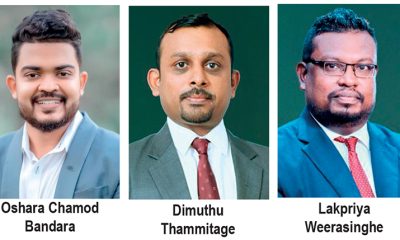Editorial
Cop killings, terror and duplicity

Tuesday 12th January, 2021
The US is mourning the death of Capitol police officer Brian Sicknick. He died after assault during the 06 Jan. riot. Four pro-Trump troublemakers also perished in clashes with the police. The White House has come under heavy fire for taking four days to lower the Stars and Stripes to half-staff in honour of the fallen police officer.
Democrats’ consternation knows no bounds; they have gone into overdrive to impeach President Donald Trump, who is leaving office on 20 January, for having allegedly incited the Washington riot, which desecrated the Capitol, resulted in five deaths, disrupted a congressional joint session engaged in counting electoral votes, and, above all, tarnished the image of the US internationally. US House Speaker Nancy Pelosi has called for President Donald Trump to be removed from office forthwith; she has called him “a very dangerous person who should not continue in office.” Whether the Democrats will succeed in their endeavour is doubtful, but their impeachment bid can be seen as an attempt to disgrace Trump further.
The western media have called the mobsters who ran amok on Wednesday a bunch of domestic terrorists and called for stringent action against them. Some of them have already been arrested and prosecuted. They must be made to face the full force of the law for what they did.
The protesters surely had a problem although the way they sought to have it addressed was uncivilised. They said they believed there had been election malpractices and wanted their allegations probed. The US police have not been flayed for causing the deaths of four mobsters; no call has been made for negotiations with the rioters. Neither the US media nor the international human rights groups nor the EU nor the UNHRC nor any other organisation has advocated a dialogue with the pro-Trump troublemakers, who are being arrested and hauled up before courts. In fact, there must be no negotiations with such aggressive elements who take the law into their own hands in a bid to achieve their political goals. The US police cannot be blamed for having used force to bring the situation under control; hadn’t they done so, the mob would perhaps have set the Capitol ablaze.
But how do US politicians, the western media, the EU, human rights groups and others respond when democracy comes under attack in the developing countries, where even heads of state, senior politicians and thousands of civilians become victims of violent elements who claim to have political goals?
In this country, terrorists assassinated a head of state; President Ranasinghe Premadasa died in a terrorist bomb blast in 1993. President Chandrika Bandaranaike Kumaratunga narrowly escaped death in a terror attack in 1999. Foreign Minister Lakshman Kadirgamar was killed by a terrorist sniper in 2005. Terrorism also snuffed out many other lives. Terrorists lined up and shot dead about 600 policemen, who had surrendered to them in 1990. But the US took the lead in pressuring Sri Lanka to keep negotiating with the LTTE despite all those heinous crimes, in comparison to which the Capitol siege pales into insignificance.
The US has arrested some suspects responsible for the Easter Sunday carnage and instituted legal action against them. It deserves praise for getting tough with those terror suspects. But what would have been the situation if Sri Lanka had succumbed to US pressure and spared the military muscle of the LTTE in 2009? The war would have dragged on, and there would have been scores of bomb blasts and massacres far worse than the Easter attacks and thousands of civilians would have perished in them, during the last eleven years or so; political assassinations and child conscription also would have continued, and the youth who are engaged in pro-LTTE protests in the North at present would have been in the Tiger bunkers toting guns instead of smartphones. The same goes for the southern terrorists, who carried out numerous political assassinations, destroyed public property worth billions of rupees, paralyzed the entire education system, and ran a parallel government to all intents and purposes. If the JVP had not been militarily neutralised, its present-day leaders who are pontificating on the virtues of democracy would have been signing death warrants for their political rivals and public officials. It is the failure on the part of the state to remove the NTJ scourge before 21 April 2019 that led to the destruction of as many as 268 lives. The elimination of terrorism helps save lives and restore law and order.
One can only hope that the Biden administration to be installed next week will not be swayed by terror fronts in various guises, and the US will realise the need to shed double standards and fight terrorism in all its forms and manifestations.
Terrorism is like coronavirus; it spares none, and a truly global effort is required to eliminate it.
Editorial
Lotus-eating lawmakers

Saturday 7th February, 2026
It is popularly said in this country that when one has power one has no brains, and when one has brains, one has no power—bale thiyanakota mole ne, mole thiyanakota bale ne. However, some present-day politicians have proved that they have neither power nor brains. Painful knocks they and their parties received from a disillusioned public in the 2024 elections do not seem to have had a sobering effect on them if their misplaced priorities are any indication.
Former Minister Rohitha Abeygunawardena waxed eloquent in Parliament on Thursday, lamenting as he did the high prices of a popular brand of arrack, known as ‘gal’, so named because it was originally manufactured by a state distillery located in the Galoya valley. He fervently appealed to the government to consider slashing the ‘gal’ arrack prices ‘for the benefit of the ordinary people’ who consumed it. Deputy Minister of Economic Development Nishantha Jayaweera reportedly said the government was exploring the possibility of lowering excise duties on liquor.
MP Abeygunawardena is not alone in campaigning for making ‘gal’ arrack available at lower prices. His former ministerial colleague Chamara Sampath Dassanayake also keeps asking the government to reduce the ‘gal’ arrack prices. Their rotgut mission, as it were, may have gladdened the hearts of those who prioritise ‘warming the liver’ over everything else including the need to dull their family members’ pangs of hunger. The question is why these politicians are not equally vocal on the need to solve burning problems affecting the public, such as the escalating cost of living, and the prevalence of malnutrition and stunting among children. This country is not short of men who spend money on liquor at the expense of the nutritional needs of their family members, especially children.
It is doubtful whether the MPs calling for liquor price reductions have seen the findings of a Select Committee of Parliament which was appointed to look into child malnutrition issues in Sri Lanka. The committee report, issued last year, has said that according to the National Nutrition and Micronutrient Survey conducted in 2022, the prevalence of low birth weight in a nationally representative sample was 15.9%. The June 2023 Nutrition Month report identified an increase in underweight and stunting among infants and children up to two years of age compared to 2022, the committee report has said, noting that the most alarmingly high underweight rate of 24.6% was recorded in the Nuwara Eliya District, where one in every four children was identified as moderately or severely underweight. In June 2023, the proportion of children affected by poverty in Sri Lanka was 10%, and 1.2% of all children under the age of 5 were affected by severe acute malnutrition, the committee has said. Reports issued by non-governmental research organisations have revealed that about 43% of Sri Lankan children experience some nutritional problems, including stunting, underweight or wasting. Why don’t the members of both sides of the House address these issues which are bound to impact the entire nation adversely?
We have not heard the campaigners for cheap liquor addressing issues faced by women, who do not seek solace in alcohol despite working as hard as men and being equally fatigued and stressed. They toil in garment factories and on estates and in West Asia to keep their home economies and the national economy afloat. But the alcohol and tobacco consumption among them is negligible. Hats off to them!
Most of all, the National Authority on Tobacco and Alcohol (NATA), during a recent interaction with the Parliamentary Sectoral Oversight Committee on Health, Mass Media and Women’s Empowerment, has revealed that approximately 22,000 deaths occur annually in Sri Lanka due to tobacco and alcohol consumption, according to a report published in this newspaper on 30 Jan. 2026. The NATA has disclosed that the country suffers an economic loss of between Rs. 225 billion and Rs. 240 billion a year due to the consumption of tobacco products and alcohol. The focus of all people’s representatives must be on how to reduce liquor and tobacco consumption to save precious lives and state funds.
When will our politicians stop playing to the gallery and grow up?
Editorial
Threats, hubris and flippancy

Friday 6th February, 2026
Some Opposition big guns went ballistic yesterday in Parliament, lashing out at the JVP-NPP government for refusing to provide SJB MP Rohana Bandara with security in view of threats to his life. They have been urging the government to ensure the protection of MP Bandara, but in vain. It looks as if the eminences grises of the JVP remote-controlled the national legislature.
The government MPs made some facetious remarks about MP Bandara’s demand for security. Their flippancy is deplorable. Gun violence is on the rise, and hardly a day passes without a fatal shooting in this country. Underworld gangs have amply demonstrated their ability to strike anywhere at will. The police swing into action only after crimes are committed.
The police first made a proper threat assessment and concluded that MP Bandara should be provided with security. The government, which had made light of his complaint, was left with egg on its face. It disregarded the police report and sought to obfuscate the issue. While it was drawing fire in Parliament for the inordinate delay in taking action to protect MP Bandara, the police issued a counter-report, reversing their earlier threat assessment, and, lo and behold, claimed that the threats to the MP emanated from a rival in his own party. Obviously, the government pressured the police to make an about-turn and help give a political twist to the issue. The police have earned notoriety for their absurd claims, which are legion, and trotting out lame excuses in defence of their political masters.
Opposition Leader Sajith Premadasa yesterday chided the government frontbenchers for flippancy and making a false claim that MP Bandara had received threats from someone in his own party. He said a Deputy Inspector General of Police in Anuradhapura and intelligence services had initially recommended that MP Bandara be given adequate security. But the government members continued to crack themselves up. Ruling party politicians behave in this manner when power goes to their heads.
The Opposition MPs are in a dilemma where their security is concerned. When they face threats and ask for protection, the Speaker says the government goes by threat assessments done by the police in deciding whether to provide them with security. The police do as the government says, and issue reports justifying its position that there are no threats to its political rivals. Thus, the Opposition MPs have no one to turn to when their lives are in danger. The government MPs are apparently deriving some perverse pleasure from MP Bandara’s predicament.
Let the government be warned that it is making a big mistake by refusing to provide MP Bandara with security. Sri Lanka is no stranger to political assassinations. The JVP itself has gunned down hundreds of its political rivals. The UNP, the SLFP, etc., too, have a history of political violence, which claimed many lives. Those who do not learn from history are said to be doomed to repeat it. One may recall that an assassin’s bullet that pierced DUNF leader and former Minister Lalith Athulathmudali’s heart in April 1993 became the undoing of a UNP government. That repressive regime disregarded the then Opposition’s demand that the UNP dissidents be provided with security as they were facing threats to their lives from the LTTE as well as pro-UNP goons.
Most of all, a fundamental democratic and legal norm underpinning modern parliamentary systems is that all members of Parliament are equal in rights and privileges and must be treated as such. It is unbecoming of a government to dismiss threats to an Opposition MP’s life, and make flippant remarks, which reflect poorly on it.
Editorial
All’s not well that ends well?

Thursday 5th February, 2026
The argy-bargy is done, and the battle’s lost and won, one might say with apologies to the Bard. A prolonged tug of war between President Anura Kumara Dissanayake and the Constitutional Council (CC) has come to an end. The newly reconstituted CC has unanimously approved President Dissanayake’s nominee for the post of Auditor General (AG). The National Audit Office (NAO), which remained headless for months, now has a new head—Samudrika Jayaratne, who has served as Senior Deputy Auditor General. But the question is whether one can truly say, in this case, all’s well that ends well.
We do not intend to raise suspicions about the integrity of the new AG, but there are some questions that warrant answers. The critics of her appointment have levelled some allegations against her, including transactions tainted by conflict of interest and ‘unprofessional conduct’. They have also claimed that the Commission to Investigate Allegations of Bribery or Corruption has launched an investigation into allegations against her. Unsubstantiated as these allegations are, they have the potential to raise doubts in the public mind about the new AG’s integrity and that of the NAO under her. Hence the need for her to respond to them.
Thankfully, President Dissanayake’s efforts to parachute a total outsider loyal to the JVP into the post of AG came a cropper because the immediate predecessors of the three newly appointed civil society members of the CC intrepidly resisted pressure from the Executive. However, the government ought to explain why it overlooked Dharmapala Gammanpila, who served as the Acting AG. The general consensus is that he is the most eligible candidate for the post of AG. Four Mahanayake Theras wrote a joint letter to President Dissanayake, recently, urging him to appoint Gammanpila as AG. The prelates’ request resonated with those who cherish good governance, but President Dissanayake ignored it.
The JVP-led NPP’s election manifesto, A Thriving Nation: A Beautiful Life, attributes the deterioration of the public service to ‘political appointments’ and ‘state workers making political decisions’. Among the steps the NPP has promised to take to straighten up the public service are ‘merit-based appointments and promotions’. But its refusal to appoint Gammanpila as AG has raised many an eyebrow and lent credence to its critics’ claim that it is wary of having an upright official at the helm of the NAO because it does not want various fraudulent deals in the public sector on its watch exposed; some of them are the questionable release of 323 red-flagged freight containers without mandatory Customs inspections from the Colombo Port and the rice and coal scams. The only way the government can show that the merit principle it claims to uphold has not fallen by the wayside and its commitment to good governance is genuine is to give credible reasons for its decision to overlook the most eligible candidate for the post of AG.
The heads of all state institutions must be above suspicion like Caesar’s wife, so to speak, for a fish is said to rot from the head down. One may recall that the Police under Deshabandu Tennakoon, whom the SLPP-UNP government appointed IGP by unashamedly subverting the CC process amidst protests, became subservient to the then rulers. Sadly, the situation has not changed much; the long arm of the law has become a cat’s paw for the JVP-NPP government. While claiming to uphold good governance, the incumbent government has embarked on a campaign to vilify the Attorney General in a bid to pressure him to obey its dictates. Thankfully, he has proved that he is made of sterner stuff, and his staff, the Bar Association of Sri Lanka and others have circled the wagons around him.
Meanwhile, the CC’s unanimous endorsement of the appointment of the AG has diminished the Opposition’s moral right to criticise the actions of the NAO under the new head.
-

 Business4 days ago
Business4 days agoSLIM-Kantar People’s Awards 2026 to recognise Sri Lanka’s most trusted brands and personalities
-

 Business6 days ago
Business6 days agoAltair issues over 100+ title deeds post ownership change
-

 Business6 days ago
Business6 days agoSri Lanka opens first country pavilion at London exhibition
-

 Business5 days ago
Business5 days agoAll set for Global Synergy Awards 2026 at Waters Edge
-

 Business4 days ago
Business4 days agoAPI-first card issuing and processing platform for Pan Asia Bank
-

 Business6 days ago
Business6 days agoESOFT UNI Kandy leads the charge in promoting rugby among private universities
-

 Editorial2 days ago
Editorial2 days agoAll’s not well that ends well?
-

 Features2 days ago
Features2 days agoPhew! The heat …













